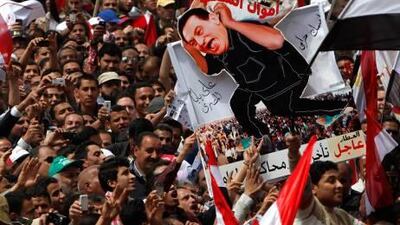CAIRO // The former Egyptian president Hosni Mubarak was "put on trial" in the court of public opinion yesterday. But to nobody's surprise, he did not show up for the event.
An informal "people's court" sitting in the Egyptian capital's Tahrir Square called witnesses and deliberated in front of tens of thousands of protesters who gathered to urge a real trial for the deposed leader on charges of corruption and ordering deadly assaults on protesters. The demonstration - the largest seen in Cairo for a month - capped a week of growing calls in the press for prosecutors to bring charges against Mr Mubarak.
Any move to try Mr Mubarak, who has been in seclusion at a villa in Sharm el Sheikh for two months and is now under formal house arrest, would satisfy widespread calls for justice but could risk alienating a broad section of Egyptians who are already worried that the country's destabilising political revolution has gone too far, analysts say.
Mahmoud el Khudeiry, a respected former judge who headed the people's court, rejected suggestions that Egypt should delay a real trial for Mr Mubarak until a permanent government is elected and sworn in. The families of protesters who were killed or injured deserve justice, he said, and a trial would serve as the ultimate guarantor that Mr Mubarak's supporters would not roll back Egypt's political transformation.
"This court expresses the Egyptian people's dissatisfaction with the fact that Mubarak and his family have not been tried," said Mr el Khudeiry, a lawyer and a member of the Muslim Brotherhood, the country's largest Islamist group.
"He should be tried as soon as possible because any postponement will allow him to finance more of the counter-revolution."
At the Tahrir demonstration yesterday, the most common refrain was "the people want the trial of Mubarak", a play on the most popular chant of the January and February protests: "the people want the fall of the regime".
Prominent opposition figures, including leaders of the Muslim Brotherhood and Mohammed ElBaradei, the Nobel laureate have called in the last week for the prosecution office to bring charges.
Proponents of a trial have pointed to Tunisia, where government officials in February brought charges against the former president, Zine el Abidine Ben Ali, and sought his extradition from Saudi Arabia.
The military-led government has taken halting steps towards a criminal investigation of Mr Mubarak and his family. Aside from putting the former president under house arrest, the courts have frozen his bank accounts in Egypt and investigators plan to question his son, Gamal Mubarak, this week, the state news agency MENA reported.
Few doubt that Mr Mubarak was closely involved in the regime's efforts to suppress the widespread protests that began in Cairo on January 25. Street battles between protesters, police and pro-regime thugs left at least 384 dead and thousands injured.
Prosecutors have already brought murder charges against the former minister of interior, Habib el Adly, and the former directors of state security. Mr el Adly and his co-defendants have denied the charges.
But putting Mr Mubarak himself on public trial would be a much more significant step, said Shadi Hamid, an expert on Egyptian politics at the Saban Center for Middle East Policy at Brookings.
"This is different than the other demands that the protesters have issued," he said. "This is potentially much more polarising, and could drag Egypt into a very contentious debate — it's unclear if that's something Egypt needs right now."
In several prominent examples in history where democratic governments took over from authoritarian leaders, such as Chile in 1990 and Argentina in 1988, new governments gave their predecessors temporary immunity from criminal prosecution to smooth the transition of power.
Amr Moussa, the secretary general of the Arab League and a leading candidate for president, rejected suggestions that Mr Mubarak should be put on trial in an interview with Spanish daily El Pais in February, saying he "is retired and should be treated like an ex-president". Mr Moussa has not spoken publicly on the issue since.
Protesters' demands for justice have to be balanced against the risk of destabilising a precarious political order, Mr Hamid said. There was no evidence that public support for a trial of the former president—unprecedented in modern Egyptian history—extends across all sectors of society, he added.
"As much as people hated Mubarak, there's still a sense that there are limits to what should be done against him," he said. "Part of that is a deference to authority, a deference that exists in almost all societies.
"There's always a sense that revolutions can go too far, and that's something that ordinary Egyptians who are sympathetic to the revolution might be worried about."
Egypt's military rulers have been put in a difficult position, Mr Hamid said: "it's a lose-lose situation, they'll be criticised either way".

